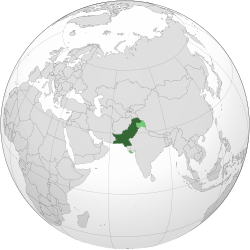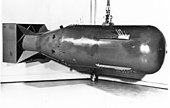User talk:NPguy
|
Index
|
||
|
This page has archives. Sections older than 90 days may be automatically archived by ClueBot III when more than 10 sections are present. |
Nuclear Technology
Regarding your undo of my edit on the above-mentioned page.
A gentle reminder that whenever you undo any edit, it is a basic Wikipedia norm to tell what led you to do that. It is even better if you can leave something on the user's talk page. Simply saying that "these kinds of edits make things worse" is an insufficient reason for undoing any edit. It implies that you didn't see or read my edit and undid it, just because of the edit summary; I hope that is not the case. It may be the case that most such edits are bad but it is kind of necessary that you first see the edit and then, take any decision. I have undone your undone :) of my edit. Feel free to discuss this. Viewing your talk page shows that this is a big problem of yours. Please try to amend it. FlyingNinja1 (talk) 05:09, 15 May 2020 (UTC)
ArbCom 2019 election voter message
Please check my edit to Critical mass
If you have the time, could you check my edit to the lede of Critical mass here? Regards, 220 of Borg 11:05, 13 June 2020 (UTC)
MAUD Commitee
Hi! I'm searching for someone to contribute a review to Wikipedia:Featured article candidates/MAUD Committee/archive1. Someone who is not one of the usual suspects. If you could have a look, that would be much appreciated. Hawkeye7 (discuss) 10:33, 14 June 2020 (UTC)
ArbCom 2020 Elections voter message
RNM edit
Imagine a day when I don’t have to wonder what a beautiful world is and we can all share our truths? ❤️ KnowStringsAttached (talk) 23:46, 25 January 2021 (UTC)
ArbCom 2021 Elections voter message
IFNEC edit reverted
Hi. I did not understand why you reverted my edit updating the composition of IFNEC. The title of the article is IFNEC (not GNEP) and the paragraph in discussion reads: "In 2010, the GNEP was renamed the International Framework for Nuclear Energy Cooperation. IFNEC is now an international partnership ..." The key word here is "now". This paragraph is an IFNEC paragraph and GNEP is simply in the past.
Could you please reread the entire paragraph with my edit and explain what you find incorrect? Were the article named GNEP, your edit summary would make more sense to me, but as it currently stands IFNEC is not being correctly described in wikipedia. Erkcan (talk) 06:17, 26 June 2022 (UTC)
- Thanks.Erkcan (talk) 04:37, 30 June 2022 (UTC)
"Turkey" vs. "Türkiye"
in spite of the Erdoğan government's proclamation and the United Nations' adoption of their preferred name, the English-language WP:COMMONNAME of this country remains "Turkey", and it is Wikipedia policy to use that name.
Please note that this is not because of anti-Turkish bias or a desire not to keep up with the times; it's that English Wikipedia follows English language usage, not prescriptions by any one group, no matter how official. Please be assured that if mainstream English language use changes (as it did, for example, with "Bombay" changing to Mumbai and "Peking" changing to Beijing), English Wikipedia policy will follow that change, for exactly the same reason that it resists the change now. The WP:COMMONNAME and Wikipedia:Naming conventions (geographic names) pages have more information on this.
If you would like to dispute this, please take this up at Talk:Turkey, where the issue has been discussed repeatedly and at great length. Please don't make any similar changes to other articles unless this is first endorsed by community consensus. — The Anome (talk) 19:37, 29 October 2022 (UTC)
ArbCom 2022 Elections voter message
Hello! Voting in the 2022 Arbitration Committee elections is now open until 23:59 (UTC) on Monday, 12 December 2022. All eligible users are allowed to vote. Users with alternate accounts may only vote once.
The Arbitration Committee is the panel of editors responsible for conducting the Wikipedia arbitration process. It has the authority to impose binding solutions to disputes between editors, primarily for serious conduct disputes the community has been unable to resolve. This includes the authority to impose site bans, topic bans, editing restrictions, and other measures needed to maintain our editing environment. The arbitration policy describes the Committee's roles and responsibilities in greater detail.
If you wish to participate in the 2022 election, please review the candidates and submit your choices on the voting page. If you no longer wish to receive these messages, you may add {{NoACEMM}} to your user talk page. MediaWiki message delivery (talk) 00:32, 29 November 2022 (UTC)
ArbCom 2023 Elections voter message
Hello! Voting in the 2023 Arbitration Committee elections is now open until 23:59 (UTC) on Monday, 11 December 2023. All eligible users are allowed to vote. Users with alternate accounts may only vote once.
The Arbitration Committee is the panel of editors responsible for conducting the Wikipedia arbitration process. It has the authority to impose binding solutions to disputes between editors, primarily for serious conduct disputes the community has been unable to resolve. This includes the authority to impose site bans, topic bans, editing restrictions, and other measures needed to maintain our editing environment. The arbitration policy describes the Committee's roles and responsibilities in greater detail.
If you wish to participate in the 2023 election, please review the candidates and submit your choices on the voting page. If you no longer wish to receive these messages, you may add {{NoACEMM}} to your user talk page. MediaWiki message delivery (talk) 00:27, 28 November 2023 (UTC)
Revision of Pakistan and nuclear weapons
This article should have written something like this:
| Pakistan | |
|---|---|
 | |
| Nuclear program start date | 20 January 1972 |
| First nuclear weapon test | 28 May 1998 (Chagai-I)[1] |
| First thermonuclear weapon test | 28 May 1998 (Chagai-I)[2] |
| Last nuclear test | 30 May 1998 (Chagai-II) |
| Largest yield test | 40 kt in 1998 (PAEC claim)[3][4][5][2] |
| Total tests | 6 detonations[1] |
| Peak stockpile | 165 warheads (2021 estimate)[6] |
| Current stockpile | 165 warheads (2021 estimate)[6] |
| Maximum missile range | 2750 km (Shaheen-III)[7] |
| NPT party | No |
| Nuclear weapons |
|---|
 |
| Background |
| Nuclear-armed states |
|
Pakistan is one of nine states that possess nuclear weapons. The official numbers of nuclear arsenals are subjected to secrecy but estimated by the arms control think tanks measures that Pakistan has 165 nuclear devices.[6] Pakistan has signed and ratified the Biological Weapons Convention (BWC) in 1972 and the Chemical Weapons Convention in 1997. Deflecting the international pressure, Pakistan has neither signed the Comprehensive Nuclear-Test-Ban Treaty (CTBT) nor the Nuclear Non-Proliferation Treaty (NPT) and has blocked the negotiation of the Fissile Material Cutoff Treaty (FMCT), considering all as discriminatory and against its national security interests.: 86:94 [8]
Development on the nuclear weapons begin in secrecy under Zulfikar Ali Bhutto's administration, which delegated the program to the Pakistan Atomic Energy Commission (PAEC) in January 1972.[9][10][11][12] Motivated by the off-set fears driven by the India's invasion in 1971,[13] and to maintain the regional balance of power, Pakistan has conducted the nuclear weapons testing in a series namely, Chagai-I and Chagai-II, at its nuclear test site in a response to India's tests in 1998.[14],
Officially, Pakistan has maintained a "first-use" nuclear weapons policy and, over the years, it has been developing its capability as a nuclear triad as a part of its version of "Full Spectrum Deterrence" that addresses its deterrence strategy in a lieu of conflict with other opposing actors.[15][16]
If you agree to this version, we can go and publish it. It addresses all WMDs not just nuclear weapons, policies and rationals.
- ^ a b "Pakistan Nuclear Weapons – A Chronology". Federation of American Scientists (FAS). FAS (Pakistan Nuclear Weapons – A Chronology). Archived from the original on 2012-04-27. Retrieved 2012-05-05.
- ^ a b "Pakistan Nuclear Weapons: A Brief History of Pakistan's Nuclear Program". Federation of American Scientists. 11 December 2002. Retrieved 2019-10-30.
- ^ Cite error: The named reference
faswas invoked but never defined (see the help page). - ^ Sublette, Carey (10 September 2001). "1998 Year of Testing". Nuclear Weapon Archives. Archived from the original on 2013-01-01. Retrieved 2013-01-12.
- ^ Approximating and calculating the exact, accurate and precise yields are difficult to calculate. Even under very controlled conditions, precise yields can be very hard to determine, and for less controlled conditions the margins of error can be quite large. There are number of different ways that the yields can be determined, including calculations based on blast size, blast brightness, seismographic data, and the strength of the shock wave. The Pakistan Government authorities puts up the yield range from 20-~40kt (as noted by Carey Sublette of the Nuclear Weapon Archives in her report. The explosion measured 5.54 degrees on the Richter magnitude scale, the PAEC provided the data as public domain in the KNET sources.
- ^ a b c "Global nuclear weapons". sipri. Archived from the original on 2021-07-19. Retrieved 2021-07-18.
- ^ "Test launch of Pakistan's 'Shaheen-III' surface-to-surface ballistic missile successful". mid-day. 9 March 2015. Archived from the original on 2016-03-04. Retrieved 2016-04-26.
- ^ Chakma, Bhumitra (12 October 2012). Pakistan's Nuclear Weapons. Routledge. p. 200. ISBN 978-1-134-13254-6. Retrieved 2024-01-23.
- ^ "Bhutto was father of Pakistan's nuclear weapons programme". Archived from the original on 2012-03-14. Retrieved 2011-04-11.
- ^ Weissman, Steve R. and Herbert Krosney, The Islamic Bomb. New York: Times Book). 1981: page 45.
- ^ Chakma, Bhumitra, pg 42, The Politics of Nuclear Weapons in South Asia, Ashgate Publishing Company, Burlington, VT, USA, 2011
- ^ A. Q. Khan (19 January 2015). "An indomitable man". The News International. Archived from the original on 2015-07-25. Retrieved 2016-04-26.
- ^ Khan (2012, pp. 174–178)
- ^ Rehman (1999, pp. 16–17)
- ^ Bommakanti, Kartik (24 July 2023). "Pakistan's latest nuclear antics in the form of Full Spectrum Deterrence" (html). orfonline.org. Retrieved 2024-01-23.
- ^ Abdullah, Sannia (1 December 2016). "The Quest for Escalation Dominance: Pakistan?s Response of Full Spectrum Deterrence" (pdf). osti.gov. ABQ, New Mexico: Sandia National Lab. (SNL-NM), Albuquerque, NM (United States). Retrieved 2024-01-23.

